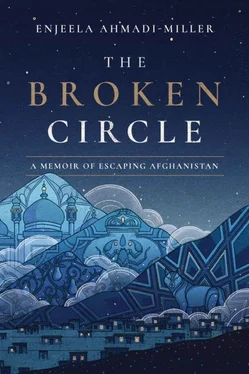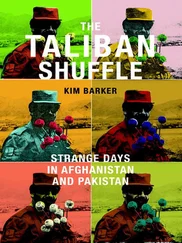It wasn’t as difficult a ride as the Hindu Kush climb months before. The terrain was uneven, strewn with rocks and fallen trees, but the mules seemed to know the path well. The day had grown warm, and the very tall mountains were still far north of us, but as it drew into the afternoon, the sun disappeared behind clouds and a chill returned.
At the next village, Ram found us a cabin to lodge in. It was rustic but warm, with a large stone fireplace along one side. Ram and Zia stoked the fire with fresh logs, and the one-room cabin quickly warmed up.
Cleaned up for dinner, we sat around the raging fire and ate our fresh vegetables and rice and drank warm tea that Padar had purchased in the village. We slept easily that night in small and spare but warm beds. Morning came too quickly.
“Today we will cross into Nepal,” Ram told us as we mounted our mules.
“But we’re in India now, why do we need to go to Nepal?” Laila asked.
“It’s a much safer route if we go through Nepal,” he said.
We set off in the morning mist. We had been traveling north, and the Mechi River was now fragmented from a wide and deep river to a series of rivulets. We rode all morning along a flat plain full of low trees and shrubs. The river itself was a series of streams that meandered across a sandy riverbed that in spring would fill to a great torrent with runoff from the Himalayas off to the far north.
We dismounted at the foot of the makeshift bridge that crossed one of the streams. We all stared at it. Narrow, not more than two feet wide, it was made from woven bamboo shoots, with a railing of bamboo stalks lashed together. It skimmed the surface of the sand banks, floated in the slow-moving streamlets, then back to a sand bank. It stretched like this far across the river to the other side: Nepal.
“It safe. It safe,” the man leading the mules said in a language Ram understood. He urged us on with a motion of his hand. Padar and Ram thanked him, and he turned his string of mules and led them away.
“I’ll go first,” I said, not wanting to waste any more time standing here, worried that the border guards would suddenly show up.
Padar came up right behind me and we crossed together. When the bridge was on the sand, it was firm underfoot, but then once it crossed the water, the bamboo dipped under my weight. We decided it was better to not be close together so that the bridge would hold our weight better. There was no fear it would sink, but our shoes got so wet we may as well have just sloshed through the streams.
Once we were all on the other side, I looked back at our path. We had traveled to the farthest tip of Bangladesh, where a finger of land punched into India along a porous border, and then hiked the thirty to forty miles across fields and into Nepal. All because we wanted to be together as a family. Padar was going to great extremes to bring us together. I thought about his poem of the birds. He was doing all of this for love.
“Come on, let’s go,” Ram urged. “This is not time for looking back.”
We moved along the path that soon came to a paved road. Padar said we needed to go south to the town of Kakarbhitta that straddled the East–West Highway to Kathmandu.
The foothills of the Himalayas were to our right, shrouded in a gray mist that moved along their rugged features; they rose in ranks until they disappeared in the haze. We hiked along a road bordered by green grasslands that riffled in the breeze. The air here smelled so pure, as if it had never been breathed before, and nothing had ever tainted it. Within a couple of hours walking, we reached the small village of Nakalbanda. The main road went right through town, where many of the townspeople rode about on bicycles. All the buildings were made of wood, with steep roofs for shedding snow. The sidewalks were narrow and covered in planks of wood. Ram stopped a man and asked for directions to a café. We entered a room with tables and chairs and a counter case of sweets and sandwiches. A nice lady served us sandwiches and Darjeeling tea from little cups. It was the sweetest, freshest tasting tea I’d ever had. Padar left to find a taxi, and soon we were bundled into an ancient van that had been garishly painted on the outside.
After a fifteen-minute drive, we checked into the Mechi Hotel next door to the main bus terminal in central Kakarbhitta.
We took turns taking showers and cleaning up the best we could, changing out of the clothes we’d slept in for the past week. Padar had us throw them away they were so smelly. At dinner that night, Padar laid out our plans. “From here on out, we are tourists. We do tourist things. I want us to think of this as a short vacation.”
Laila laughed. “Are we going to visit all the monasteries?”
“Why not?” he said with a smile.
“What about shopping?” I asked. “Can we buy some clothes?”
“Of course,” he said. “We must look like tourists when we pass into India.”
“How are we going to get through passport control?” Laila asked.
“You’ll see,” Ram said. “We won’t get into any more fights. I can promise you that.”
That was a promise I wanted to hold him to.
The bus ride to Kathmandu took us along the East–West Highway that wound through mountain passes, gradually rising higher and higher until the road settled into a deep valley. The city of Kathmandu was laid out in colorful splendor before us, surrounded by hills. In the far distance against the bluest sky were the snowcapped peaks of the Himalayas that stretched all along the horizon in both directions, one long, jagged ribbon. These were the tallest peaks in the world. It was said they touched the roof of the world, and from here it looked like they did exactly that.
It was late afternoon when we checked into our hotel, the Kathmandu Guest House in the Thamel district of the city. The rooms were neat and clean, painted in blues with yellow accents and bamboo floors, with very clean restrooms. One of our rooms had a kitchen with a stove and a refrigerator.
When we arose the next morning, Ram was gone.
“He went to India to take care of some business for us,” Padar said at breakfast. We all peppered him with questions about their plan. He held his finger to his lips. “Quiet, children. You’ll know soon enough.”
He took us shopping for clothes in Kathmandu Durbar Square. The square was magnificent. The king’s palace stood on one edge, shops full of clothes and pottery and artwork and jewelry on the other. Before we went into any of the stores, he warned us that these merchants always had two prices—one for the locals and another for the tourists. He helped me haggle for a good price on a beautiful Nepali sweater, hand-embroidered with colorful flowers.
Padar never carried a change of clothes, so he purchased himself some new pants and a shirt and shoes. My sisters and I each bought a new dress, and Zia bought new shoes.
We strolled the busy streets, taking in the sights like tourists, visiting temples that allowed non-Hindus to enter, running up the steep steps to Swayambhunath Stupa, with its gold-plated gods and multitude of spires. We toured a few palaces and visited the crowded market streets that teemed with shops and stalls. The streets were always crowded with cyclists and backpackers, bicycle rickshaws, and cars.
One afternoon Padar took us to the vegetable market, where he purchased everything he would need to make dinner. He bought some pots and pans, and that evening in the hotel, he cooked for us a dinner like we would have eaten in Kabul.
Читать дальше













